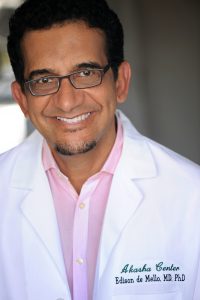An Integrative Approach to Treating Anxiety Disorders
 Anxiety disorders, the most common mental illness in the United States, affect about 40 million adults age 18 and older every year. That is, 18.1% of the population! And although anxiety disorders can successfully be treated, research indicates that only 36.9% of individuals affected by it receive treatment.
Anxiety disorders, the most common mental illness in the United States, affect about 40 million adults age 18 and older every year. That is, 18.1% of the population! And although anxiety disorders can successfully be treated, research indicates that only 36.9% of individuals affected by it receive treatment.
These numbers are even more staggering when considering the fact that individuals suffering from anxiety are three to five times more likely to go to the doctor and six times more likely to be hospitalized for psychiatric disorders than those who do not suffer from it. In other words, individuals suffering with debilitating anxiety come into the medical system very often, but it looks like we are failing them. “Why are we not properly addressing this treatable and devastating condition both socioeconomically and socioemotionally from an integrative medicine model that has been proven to work?” asks Edison de Mello, MD, PhD, and also a Diplomate of the American Board of Integrative Medicine® (ABOIM®). Dr. de Mello believes in blending traditional medicine and its well-proven medications with the integrative approach of lifestyle changes, a strong support system, and an array of scientific studies pointing to the benefits of a number of supplements used to effectively “calm the nerves and relax muscles during a bout of anxiety.
Dr. de Mello recommends that these supplements always be used in conjunction with other reliable treatments for patients who have met the DSM-5 criteria for anxiety disorders, given that anxiety disorders develop from a vast array of complex factors, including genetics, brain chemistry, personality, and life events. “The best way to deal with anxiety is by working with a mental health professional,” he says. “Also try evidence-proven approaches such as meditation, exercise, and building a strong support network. In addition to taking supplements, your diet can help improve your anxiety responses.”
One of the supplements Dr. de Mello finds especially effective is magnesium. Used for centuries as an anti-anxiety remedy, he says it stabilizes the mood and promotes a sense of calm and well-being. “Just make sure to take a supplement that contains both magnesium and calcium, since they’re interdependent,” he says. “Taking one without the other won’t do you much good.”
Dr. de Mello also touts passionflower as an anxiety reliever. Traditionally used in Europe and the Americas to calm hysteria and lift the mood, passionflower helps to increase the levels of GABA (gamma-aminobutyric acid) in the brain, thereby reducing brain activity and relaxing the nervous system. Take Passionflower in combination with valerian root or ashwagandha for optimal benefits, Dr. de Mello says.
Another supplement he recommends is theanine, an amino acid found in green tea. “Theanine has been shown to reduce stress responses in your body so you feel more relaxed, even in situations that stress you out,” he says.
Here are some other supplements Dr. de Mello recommends for keeping anxiety at bay:
- Lactium – A compound often found in milk, lactium promotes feelings of calm and helps with anxiety-related insomnia.
- B-complex – B-complex vitamins help to keep mood lifted and stabilized.
- Licorice root – This root helps to slow the production of adrenaline and cortisol, hormones released by the adrenal glands, which are the body’s stress glands.
- St. John’s Wort – This age-old home remedy lifts low moods and promotes feelings of contentment.
- Ashwagandha – Used in Ayurvedic medicine for centuries, this herb boosts your mood and promotes relaxation.
- Melatonin – If your body doesn’t produce enough of this hormone, you may be unable to sleep restfully or relax, but melatonin supplements can improve sleep and ease other anxiety-related issues.
- Probiotics – Found in the gut, these “good” bacteria support digestion, immune system health, and promote a healthy stress response.
Dr. de Mello, the Founder of the Akasha Center for Integrative Medicine in Santa Monica, CA, (akashacenter.com), perfectly exemplifies the goals of the ABOIM, a Member Board of the American Board of Physician Specialties® (ABPS). The ABOIM is committed to a health care approach that makes use of all appropriate therapeutic approaches and takes into account a person’s diet when promoting wellness. If you would like more information about the ABOIM, contact the ABPS today.










